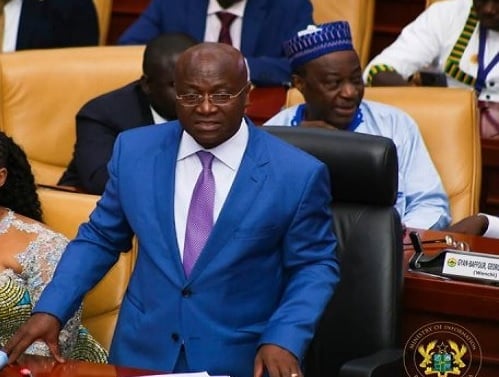The suspension of four Members of Parliament (MPs) by Speaker Alban Bagbin following a chaotic vetting session has ignited a constitutional debate, with former Majority Leader Osei Kyei-Mensah-Bonsu challenging the Speaker’s authority to impose such sanctions. Kyei-Mensah-Bonsu argues that neither the Standing Orders, which govern parliamentary procedure, nor the Constitution itself, grants the Speaker the power to suspend MPs. This disagreement centers on the interpretation of parliamentary rules and the extent of the Speaker’s disciplinary powers, raising fundamental questions about the balance of power within the legislature.
Kyei-Mensah-Bonsu acknowledges that the Speaker appropriately invoked Order 342 of the Standing Orders, which addresses maintaining order during parliamentary proceedings. However, he contends that invoking this order to justify the suspensions is a misapplication of its purpose. He argues that while the Speaker has the responsibility to maintain order, this does not extend to unilaterally suspending MPs. Kyei-Mensah-Bonsu’s position hinges on the principle that any disciplinary action against MPs must be derived from explicitly granted powers within the Standing Orders or the Constitution, neither of which, he claims, authorize suspensions by the Speaker.
The crux of the disagreement lies in the interpretation of the Speaker’s role and the extent of his disciplinary authority. Kyei-Mensah-Bonsu posits that the Speaker’s primary function is to preside over parliamentary proceedings and ensure their orderly conduct, not to act as a judge and jury over MPs. He suggests that the Speaker’s actions constitute an overreach, blurring the lines between maintaining order and imposing punitive measures. This argument highlights the potential for conflict when the Speaker’s interpretation of his powers clashes with the understanding of other members of the legislature.
The controversy raises broader questions about the mechanisms for disciplining MPs and the balance of power within Parliament. If the Speaker does not possess the authority to suspend MPs, what other avenues are available to address misconduct and maintain decorum within the chamber? The absence of clearly defined procedures and mechanisms for disciplinary action could potentially lead to further disputes and disruptions. This underscores the need for clarity and consensus on the interpretation of parliamentary rules to ensure the smooth functioning of the legislative process.
Kyei-Mensah-Bonsu’s criticism of the Speaker’s actions extends beyond the legal arguments, questioning the Speaker’s own conduct and impartiality. He suggests that the Speaker’s actions in this instance were not only procedurally flawed but also potentially motivated by bias. This accusation adds a political dimension to the debate, raising concerns about the potential for the Speaker’s office to be used for partisan purposes. The impartiality and neutrality of the Speaker are crucial for maintaining the integrity and legitimacy of Parliament.
The suspension of the four MPs has exposed a critical ambiguity in parliamentary procedures regarding disciplinary actions against members. This incident highlights the need for a comprehensive review of the Standing Orders and potentially the Constitution to clearly define the Speaker’s powers and establish a transparent and equitable process for addressing misconduct by MPs. The lack of clarity in these matters creates a breeding ground for disputes and political maneuvering, which can undermine the efficacy and credibility of the legislature. A clear and well-defined framework for disciplinary action is essential for ensuring accountability and maintaining order within Parliament.


